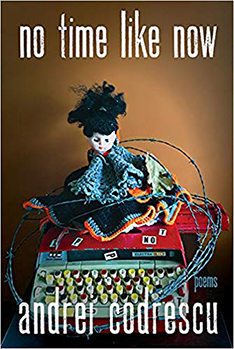No Time Like Now Review by
Charles Rammelkamp
No Time like Now
Poetry/Art
University of Pittsburgh Press, 2019
$17.00, 88 pages
ISBN: 9780822965824Anybody familiar with Andrei Codrescu’s wry commentary on NPR will, reading these poems, remember that voice: wise, droll, irreverent, subversive. Codrescu writes in the poem entitled “funny not funny”:
What I find funny is kind of sinister.
The inevitable breakdown of big ideas into particulars
speeded up on shiny rails of black merriment.Indeed, Codrescu’s deadpan humor is frequently ominous and disturbing. He goes on in “funny not funny”: “When the future masqueraded as progress / I pulled the rug. Sorry. That was funny.” The poem concludes:
American space bent around the black holes I made in it.
Many people found that funny. I not so much but not not funny.Andrei Codrescu is funny, but he’s also deadly serious. The visions of his poetry are reminiscent of the scary mind-control fictions of William Burroughs. The poem, “yes, i am my credit card,” is very much in this frame. “Progress”? As he writes in the long poem, “visual notes on the constitution”: “Hi, I’m technology, I have nothing to say, but I’m saying it anyway.”
Also, like Burroughs – and like the Dadaists before him – Codrescu’s verse often feels “cut up” (découpé), as though the linear text has been rearranged a la Tristan Tzara. Indeed, one of Codrescu’s poems is entitled “big dada.” His style is also reminiscent of Flarf poetry, “the first poetry movement of the 21st century,” a style which exhibits cut-up textures as well. One of Flarf’s pioneers is Sharon Mesmer, whose back-cover blurb notes that “there is as much joy as there is threat in the world,” and indeed, joy and threat seem to be holding hands throughout Codrescu’s poems.
The poems in No Time like Now were written between 2016 and 2018, when Codrescu had returned to New York, where he’d lived for several years in the late 1960’s not long after emigrating from Transylvania (first lived in Detroit). In New York, he became friends with Allen Ginsberg, a Beat cohort of Burroughs. The poem, “the revolution: return to new york,” was written on what would have been Ginsberg’s 92nd birthday (June 3, 2018). “I’m here for altruistic reasons so deliciously selfish / I scream from when I wake up until my credit card expires”
Like many people older than the age of, say, 50, Codrescu seems baffled and disdainful of social media. More than one poem makes fun of “likes” and tweets. “We are all a ‘like’ that is not a ‘we’,” the poem “no smoking sonnet” begins. “I gave many a ‘like’ that were in truth an ‘I don’t care,’” he goes on, and “‘Likes’ are rain falling fast on the self-erasing blackboard.” The poem ends, “Beds shook as we dimly preferred the past / Life before internet was cigarettes. How many, where, who knows?” He expresses similar disdain in “the return of the 2nd person plural”: “even email / is dying because no one wants to speak to just one person at a time, / we want to be heard by all our ‘friends’ who used to be strangers….”
This isn’t the crankiness of a codger railing about “whippersnappers” or pining for “the good old days.” He’s not a complainer, just the consummate flaneur. As he observes in “written question from freud,” “Objective observer that I am I will deeply respect / the outcome.” Of course, this is in Sigmund Freud’s voice, but it applies to Codrescu as well.
But there is a lot of lament for the passing of things, nevertheless, in No Time like Now, like the Congregation Gabriel Synagogue in “pre-call notice to a 108th street developer.” “It was the old Gabriel Synagogue that persuaded me to live here,” he writes, and now “A poster on the fence / announced the coming of something that looked suburban.”
Similarly, in “i stumbled into a reading in a bookstore in the winter of 2016,” he laments the passing of books.
I didn’t know it was a memorial when I walked
into the bookstore. You were reading from your new book.
You intoned a dirge a lament and some jokes from the smoking past.
The grey-headed mourners sat in chairs and above each head
was a cartoon bubble that said “we are alive and books are not dead”
which wasn’t quite true but it leant the scene gravity.It all may be a rueful commentary on the relentlessness of age. He writes in “how time deals with the heart’s annoying presence”: “Blame time,” and “Who has the heart to see time crease flesh, crumple pages?”
All of these elements – the deadpan humor, the seeming découpé, the rueful view of our modern world – are on display in the seven-page “visual notes on the constitution”:
Friedrich Nietzsche is the reverse-Ikea of contemporary philosophy:
easy to take apart, impossible to put back together.
The reason he is alone now is that his name is hell to spell.
Unless they are German, new philosophers are tired of googling.
Imagine if Jesus was named Grootan Ustashi.
The Ikea instruction booklet is written in cryptographic English.
Jesus was lucky with King James who hung all the bad translators.
The Bible is the Ikea of Christianity, more packed than Nietzsche.Try reading that without chuckling, while at the same time scratching your head and muttering “Wha’?”
